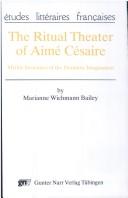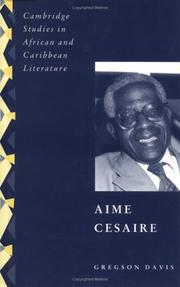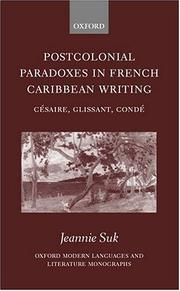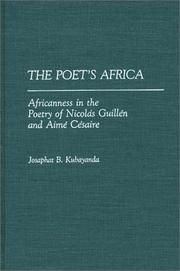| Listing 1 - 10 of 12 | << page >> |
Sort by
|

ISBN: 3823346024 Year: 1992 Volume: 49 Publisher: Tübingen : G. Narr,
Abstract | Keywords | Export | Availability | Bookmark
 Loading...
Loading...Choose an application
- Reference Manager
- EndNote
- RefWorks (Direct export to RefWorks)
Book
ISBN: 0813944880 0813944902 Year: 2020 Publisher: Charlottesville ; London : University of Virginia Press,
Abstract | Keywords | Export | Availability | Bookmark
 Loading...
Loading...Choose an application
- Reference Manager
- EndNote
- RefWorks (Direct export to RefWorks)
"The first full-length study of the literary solidarity reciprocities connecting Quebec to the francophone anticolonial movement, this book examines the poetics of solidarity to offer precise and eloquent evidence of both the possibilities and the limits of shared language as a site for transnational political agency"--
French-Canadian literature --- History and criticism. --- Césaire, Aimé --- Aquin, Hubert, --- Mongo Beti, --- Criticism and interpretation.
Book
ISBN: 9783034308953 3034308957 Year: 2017 Publisher: Oxford Peter Lang
Abstract | Keywords | Export | Availability | Bookmark
 Loading...
Loading...Choose an application
- Reference Manager
- EndNote
- RefWorks (Direct export to RefWorks)
Saint-John Perse, --- Césaire, Aimé --- Fanon, Frantz, --- Criticism and interpretation. --- Caribbean literature (French) --- Criticism and interpretation

ISBN: 0521390729 0521055423 113908528X 0511549245 9780521055420 9780511549243 9780521390729 Year: 1997 Volume: *1 Publisher: Cambridge, U. K. New York, N. Y. Cambridge University Press
Abstract | Keywords | Export | Availability | Bookmark
 Loading...
Loading...Choose an application
- Reference Manager
- EndNote
- RefWorks (Direct export to RefWorks)
Aimé Césaire is arguably the best-known poet in the French Caribbean. His poetry and drama have established his formidable reputation as the leading francophone poet and elder statesman of the twentieth century. In this study Gregson Davis examines the evolution of Césaire's poetic career and his involvement with many of the most seminal political and aesthetic movements of the twentieth century. Davis relates Césaire's extraordinary dual career as writer and elected politician to the recurrent themes in his writings. As one of the most profound critics of colonialism, Césaire, the acknowledged inventor of the famous term 'negritude', has been a hugely influential figure in shaping the contemporary discourse on the postcolonial predicament. Gregson Davis's account of Césaire's intellectual growth is grounded in a careful reading of the poetry, prose and drama that illustrates the full range and depth of his literary achievement.
Book
ISBN: 9781496218421 Year: 2021 Publisher: Lincoln : University of Nebraska Press,
Abstract | Keywords | Export | Availability | Bookmark
 Loading...
Loading...Choose an application
- Reference Manager
- EndNote
- RefWorks (Direct export to RefWorks)
In the first decades after the end of French rule, Francophone authors engaged in an exercise of rewriting narratives from the colonial literary canon. In The Author as Cannibal, Felisa Vergara Reynolds presents these textual revisions as figurative acts of cannibalism and examines how these literary cannibalizations critique colonialism and its legacy in each author's homeland. Reynolds focuses on four representative texts: Une tempête (1969) by Aimé Césaire, Le temps de Tamango (1981) by Boubacar Boris Diop, L'amour, la fantasia (1985) by Assia Djebar, and La migration des coeurs (1995) by Maryse Condé. Though written independently in Africa and the Caribbean, these texts all combine critical adaptation with creative destruction in an attempt to eradicate the social, political, cultural, and linguistic remnants of colonization long after independence.The Author as Cannibal situates these works within Francophone studies, showing that the extent of their postcolonial critique is better understood when they are considered collectively. Crucial to the book are two interviews with Maryse Condé, which provide great insight on literary cannibalism. By foregrounding thematic concerns and writing strategies in these texts, Reynolds shows how these re-writings are an underappreciated collective form of protest and resistance for Francophone authors.
West Indian literature (French) --- African literature (French) --- Literature --- Postcolonialism in literature. --- French literature --- History and criticism. --- Adaptations --- Césaire, Aimé. --- Diop, Boubacar Boris, --- Djebar, Assia, --- Condé, Maryse.

ISBN: 0198160186 Year: 2001 Volume: *11 Publisher: Oxford Clarendon Press
Abstract | Keywords | Export | Availability | Bookmark
 Loading...
Loading...Choose an application
- Reference Manager
- EndNote
- RefWorks (Direct export to RefWorks)
Césaire, Aimé --- Condé, Maryse --- Glissant, Edouard --- Postcolonialism --- Postcolonialisme --- Postkolonialisme --- Caribbean literature (French) --- -Postcolonialism --- -Postcolonialism in literature --- Post-colonialism --- Postcolonial theory --- Political science --- Decolonization --- History and criticism --- Cesaire, Aime --- -Conde, Maryse --- -Glissant, Edouard --- -Condé, M. --- Césaire, A. --- Criticism and interpretation --- -Criticism and interpretation --- Postcolonialism in literature --- Césaire, Aimé --- Condé, Maryse --- Glissant, Édouard, --- Condé, M. --- Criticism and interpretation. --- Glissant, Édouard --- Caribbean literature

ISBN: 0313262985 Year: 1990 Volume: 138 Publisher: New York (N.Y.) : Greenwood press,
Abstract | Keywords | Export | Availability | Bookmark
 Loading...
Loading...Choose an application
- Reference Manager
- EndNote
- RefWorks (Direct export to RefWorks)
Race in literature --- Blacks in literature --- Race dans la littérature --- Noirs dans la littérature --- Guillén, Nicolãs, --- Césaire, Aimé --- Criticism and interpretation --- Africa --- Afrique dans la littérature --- In literature --- Blacks in literature. --- Race in literature. --- Race dans la littérature --- Noirs dans la littérature --- Guillén, Nicolás, --- Césaire, Aimé --- Afrique dans la littérature --- Criticism and interpretation. --- Black people in literature.
Book
ISBN: 0813008220 9780813008226 Year: 1980 Volume: 59 Publisher: Gainesville (Fla.): University of Florida Press,
Abstract | Keywords | Export | Availability | Bookmark
 Loading...
Loading...Choose an application
- Reference Manager
- EndNote
- RefWorks (Direct export to RefWorks)
Politics in literature --- Blacks in literature --- Race awareness in literature --- Colonies in literature --- Negritude (Literary movement) --- Politique dans la littérature --- Noirs dans la littérature --- Conscience de race dans la littérature --- Colonies dans la littérature --- Négritude --- Césaire, Aimé --- Martinique --- Césaire, Aimé --- Criticism and interpretation --- Intellectual life --- Black people in literature. --- Césaire, Aimé - Criticism and interpretation --- Martinique - Intellectual life
Book
ISBN: 0674580575 9780674580572 Year: 1981 Publisher: Cambridge (Mass.): Harvard university press,
Abstract | Keywords | Export | Availability | Bookmark
 Loading...
Loading...Choose an application
- Reference Manager
- EndNote
- RefWorks (Direct export to RefWorks)
James Arnold here presents in its political and culture context the work of the greatest visionary poet writing in French since the Romantic period. Aimé Césaire's surrealism is seen as subverting, in the name of black experience, the very European high moderism he assimilated and employed. -- Amazon.com.
Modernism (Literature) --- Negritude (Literary movement) --- Poetics --- History --- Césaire, Aimé --- Criticism and interpretation --- Blacks --- Race identity. --- Criticism and interpretation. --- Aesthetics. --- Negritude (Literary movement). --- Race identity --- Black identity --- Blackness (Race identity) --- Negritude --- Race identity of blacks --- Racial identity of blacks --- Ethnicity --- Race awareness --- Literary movements --- Literature, Modern --- Crepuscolarismo --- Postmodernism (Literature) --- History and criticism --- Césaire, Aimé --- Césaire, A. --- Aesthetics --- Race identity of Black people --- Racial identity of Black people --- Black persons --- Negroes --- Ethnology --- Modernism (Literature) - Martinique --- Poetics - History - 20th century --- Blacks - Race identity --- Césaire, Aimé - Criticism and interpretation
Book
ISBN: 0253008107 9780253008107 1299466842 9781299466845 9780253006271 0253006279 9780253006301 0253006309 Year: 2013 Publisher: Bloomington : Indiana University Press,
Abstract | Keywords | Export | Availability | Bookmark
 Loading...
Loading...Choose an application
- Reference Manager
- EndNote
- RefWorks (Direct export to RefWorks)
In Free and French in the Caribbean, John Walsh studies the writings of Toussaint Louverture and Aimé Césaire to examine how they conceived of and narrated two defining events in the decolonializing of the French Caribbean: the revolution that freed the French colony of Saint-Domingue in 1803 and the departmentalization of Martinique and other French colonies in 1946. Walsh emphasizes the connections between these events and the distinct legacies of emancipation that emerged through the narratives of revolution and nationhood passed on to successive generations. Part one concerns Toussaint'
Nationalism in literature. --- Decolonization in literature. --- Nationalism --- Martinican literature (French) --- French literature --- Martinique literature (French) --- Consciousness, National --- Identity, National --- National consciousness --- National identity --- International relations --- Patriotism --- Political science --- Autonomy and independence movements --- Internationalism --- Political messianism --- History. --- History and criticism. --- Cesaire, Aime. --- Toussaint Louverture, --- Toussaint-Bréda, Pierre Dominique, --- Bréda, Pierre Dominique Toussaint-, --- Toussaint, François Dominique, --- Toussaint, Pierre Dominique, --- Louverture, Toussaint, --- Ouverture, Toussaint L', --- Ṭusain Luverṭir, --- Toussaint Louverture, Pierre Dominique, --- Toussaint L'Ouverture, François-Dominique, --- L'Overture, Toussaint, --- טוסיין לוברטיר, --- Tousen Breda, Franswa Dominik, --- Breda, Franswa Dominik Tousen, --- Lauverture, --- Louverture, --- Césaire, Aimé --- Césaire, A. --- Caribbean, French-speaking --- Haiti --- French-speaking Caribbean --- History --- Autonomy and independence movements.
| Listing 1 - 10 of 12 | << page >> |
Sort by
|

 Search
Search Feedback
Feedback About UniCat
About UniCat  Help
Help News
News